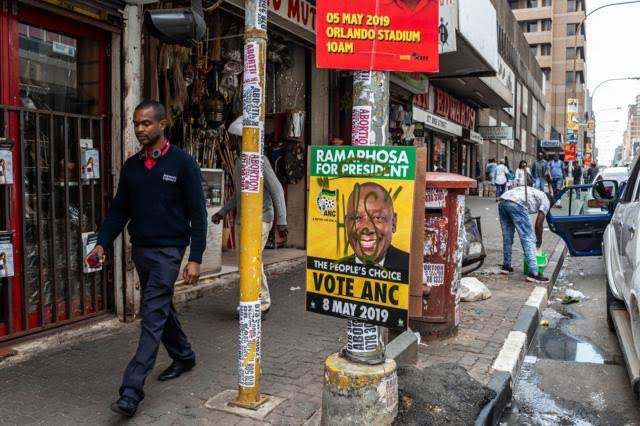
What does a widening inequality gap in South Africa mean for the Nation?
.jpeg) |
| Photo credit: BBC News Pigin |
Author: Chiahanam Nwobodo
The legendary icon Nelson Mandela delivered his inauguration speech in front of the Union buildings in Pretoria, South Africa, following his election as president in 1994. Throughout his speech, Nelson Mandela outlined his vision for a South Africa in which all people are treated with respect and equality. The country now is still quite different from Mandela’s vision even after more than two decades. Statistics indicate that the apartheid regime’s inequality gap has not narrowed and continues to be defined along racial lines. Townships, which were constructed for Black South Africans during apartheid, keep them far from sources of employment, and the majority of the country still endures a terrible educational system that leaves them unprepared for the workforce (Sguazzin, 2021).
The New York Times opines that over 90% of the wealth in South Africa is controlled by a small percentage (10%) of the country’s people, the majority of whom are white. Eighty percent of the population, primarily black, have little control of the country’s wealth (University of Washington, 2019). According to recent data, South Africa has the highest income inequality in the world, with a Gini index of roughly 0.67 (Valodia, 2023). This depicts a dismal future, even for the continent of Africa.
What ramifications does this offer? In the paragraphs that follow, we will learn. First of all, a major consequence of South Africa’s widening inequality is the speed at which violence and insecurity can escalate. The poor population, which happens to be the majority, has little opportunity to acquire work and obtain meaningful and well-paying employment because of the gap. After several setbacks, frustrations quickly surface, and a depressive and hopeless mood quickly takes hold. People quickly turn to any means necessary to make ends meet, which leads to an increase in armed robberies, drug sales, and other illegal endeavors. With about 30% of South Africa’s labor force unemployed (Galal, 2023), more people are getting desperate—especially the young population who make up the majority of the figure.
Moreover, inequality has a negative impact on the standard of human growth. Due to their restricted ability to pay for their children’s education, low-income families may decide to have more children to maximise their chances of generating income, which will ultimately lead to growth in the population. The larger number will still have difficulties obtaining financial breakthroughs due to flaws like restricted loan availability that cause underinvestment, and the cycle will continue along with an exaggeration of the poverty estimates. If the inequality gap does not close anytime soon, South Africa’s democratic processes will be severely distorted in addition to the previously mentioned issues. The wealth gap may make election malpractices more likely since wealthy people will use their riches to manipulate voters. Either through a transaction with the rich or because of pressure from hired elements, the poor will lose their right to vote for their voices. In the end, this hurts the calibre of policies implemented in the nation since the wealthy individuals who gain access to government positions will not compromise in creating institutions that benefit them at the expense of the populace.
The maxim ‘leaving no one behind’ needs to be ingrained in all government policy- making processes, at all levels, to address the issue of inequality in South Africa. Additionally, it ought to permeate the private sector’s operations, which are crucial to the development of any nation. Through public-private partnerships, the government should support entrepreneurial training for young South Africans, particularly those in underprivileged areas like rural communities, in addition to appropriately revamping the redistribution programs to fit modern reality. Educating South Africa’s youth, the country’s future leaders, on the value of achieving financial independence via hard work and innovation will make it less likely that individuals will need government assistance, in the future, to survive.
The majority of South Africans will find living more inexpensive if job possibilities are increased for qualified citizens, the asset base increased, and the social security programs for low-income households are strengthened. Finally, it should be noted that South Africa's inequality has remained a formidable obstacle to the nation's socioeconomic and political growth, preventing inclusive and active involvement of the citizenry in its growth process, resulting in dire outcomes that would only worsen if immediate action is not taken. The public and private sectors must pledge to the redistribution process. South Africa will have a greater chance of reducing the inequality gap, soon, with effective social investment programs and the fostering of entrepreneurial talents.
References
Galal, S. (2023). Unemployment rate in Africa 2024, by country. Statista. https://www.statista.com/statistics/1286939/unemployment-rate-in-africa-by-country/
Sguazzin, A (2021). South Africa Wealth Gap Unchanged Since Apartheid, Says World Inequality Lab. Time. https://time.com/6087699/south-africa-wealth-gap-unchanged-since-apartheid/
University of Washington (2019). Informal housing, poverty, and legacies of apartheid in South Africa. https://urban.uw.edu/news/informal-housing-poverty-and-legacies-of-apartheid-in-south-africa/
Valodia, I. (2023). South Africa can’t crack the inequality curse. Why, what can be done? The Conversation. https://theconversation.com/south-africa-cant-crack-the-inequality-curse-why-and-what-can-be-done-213132
